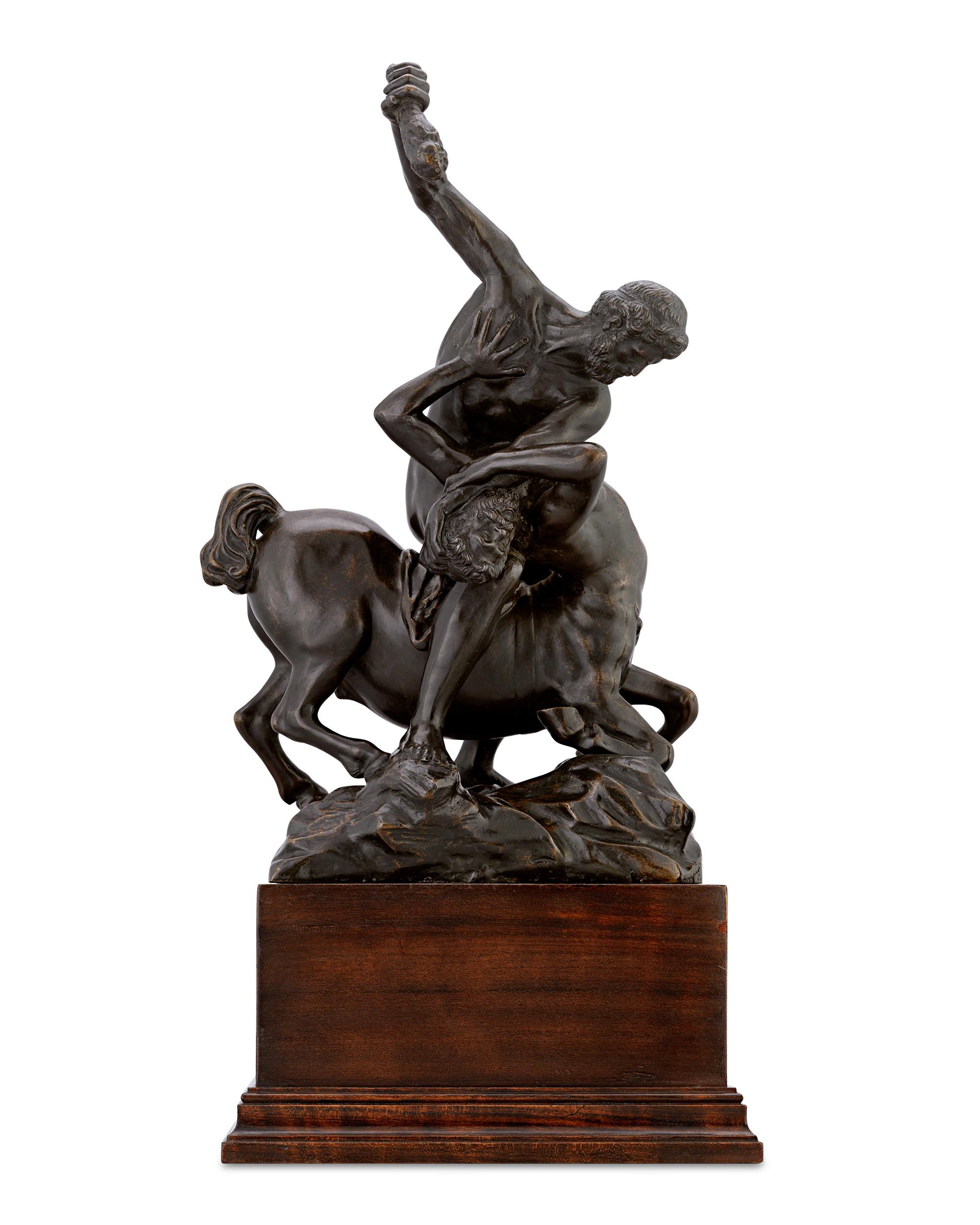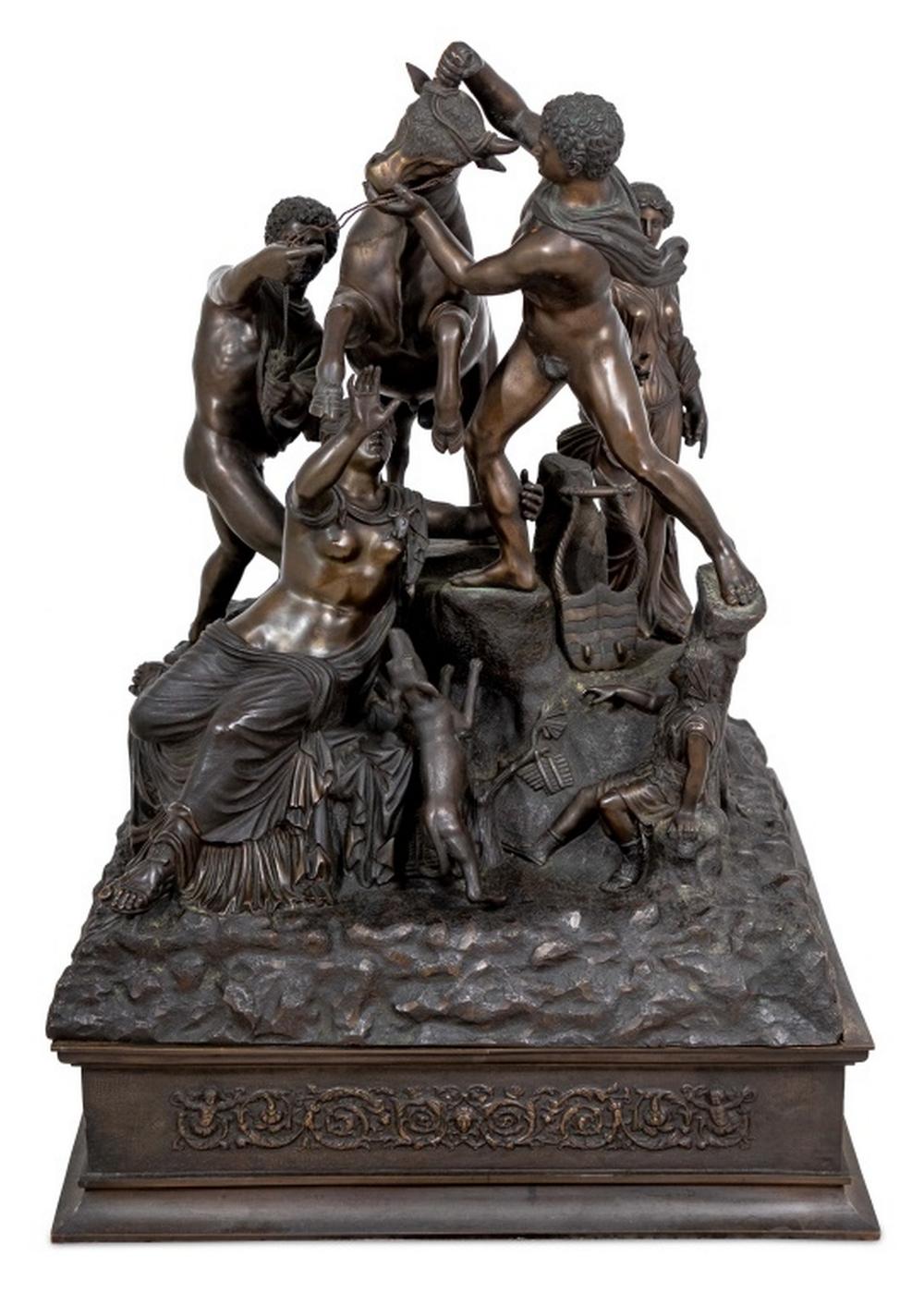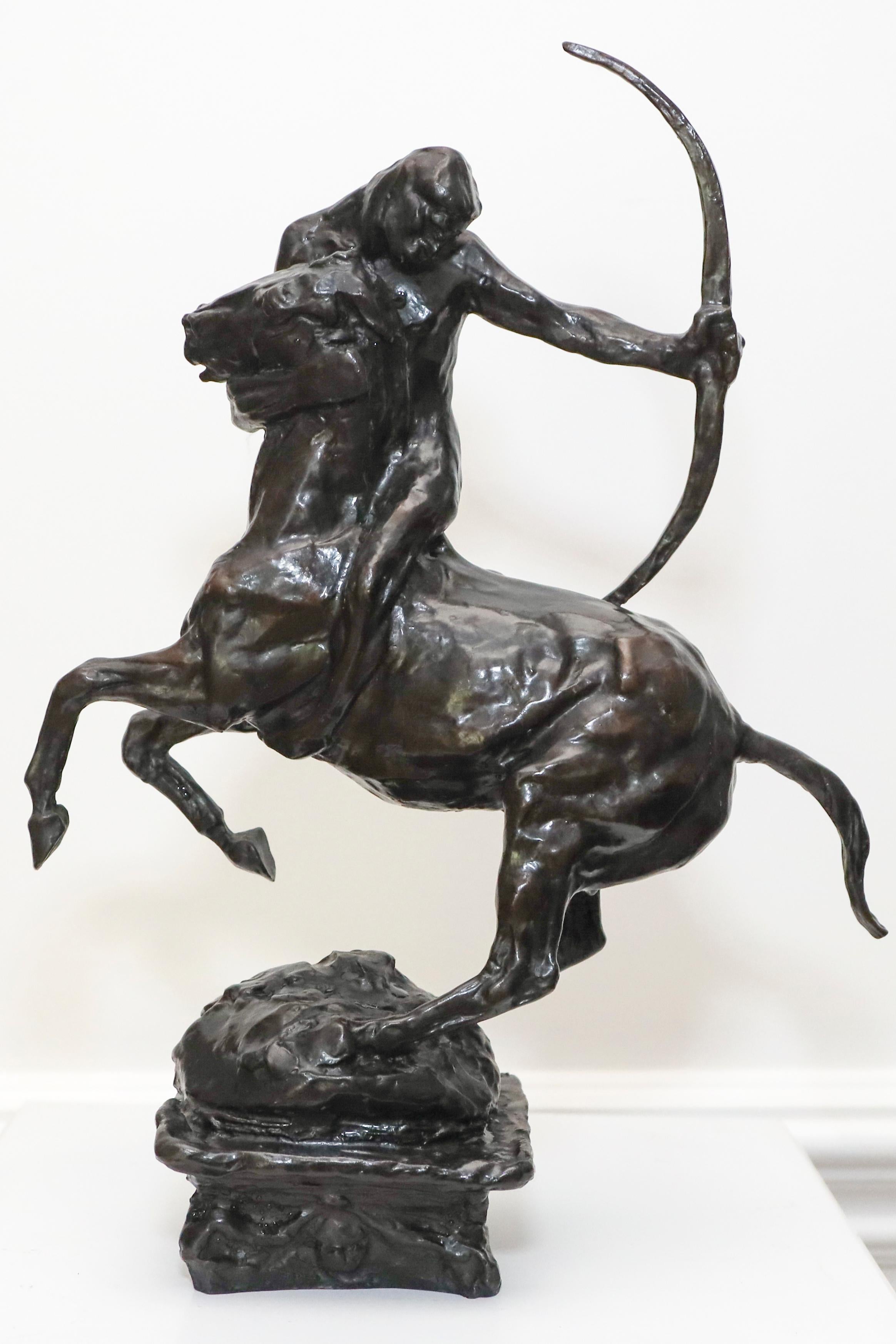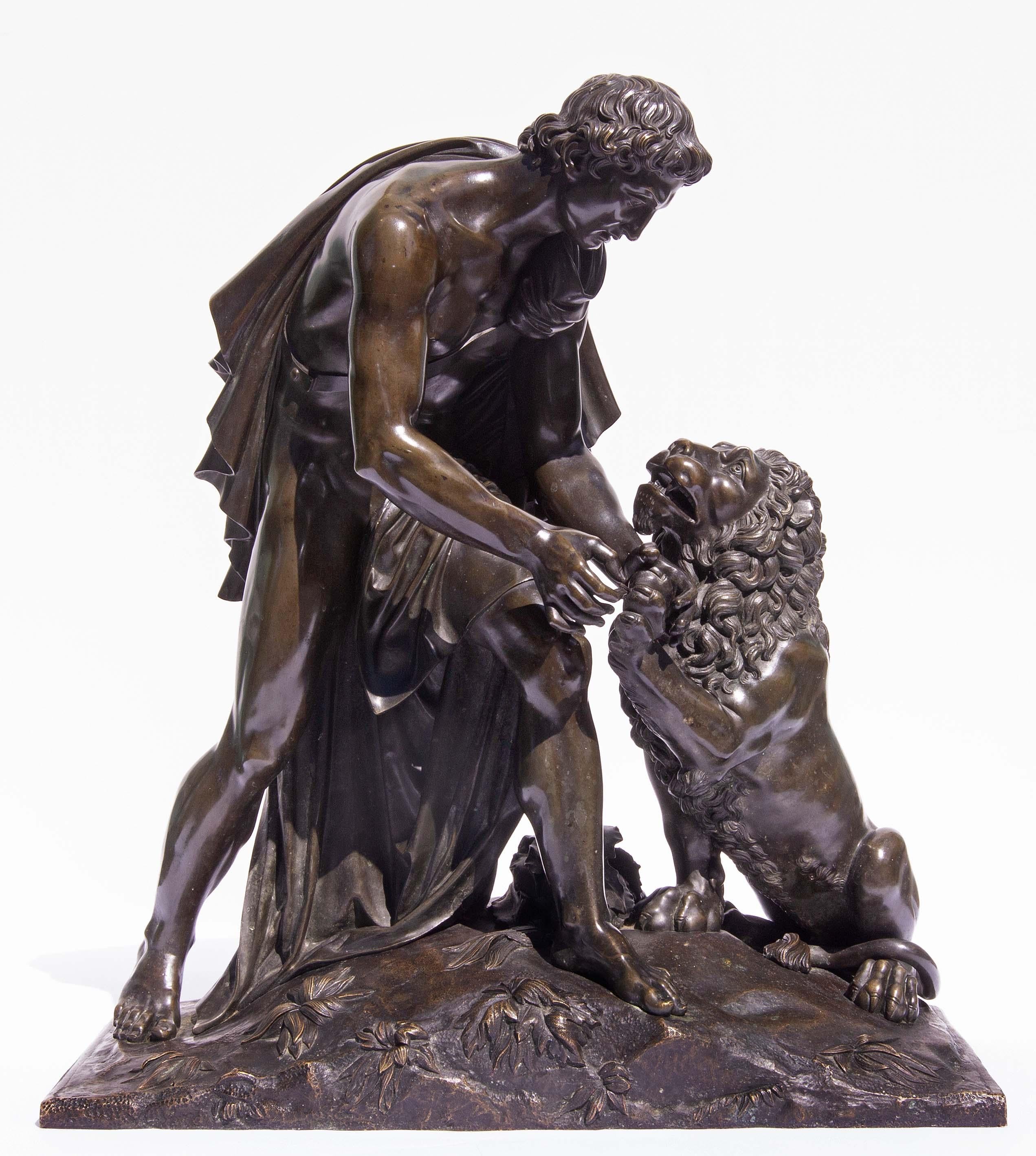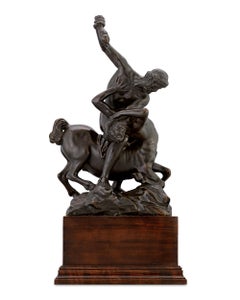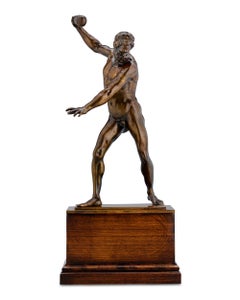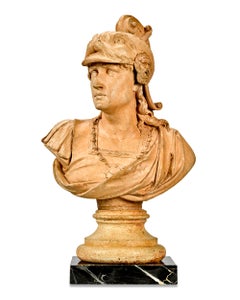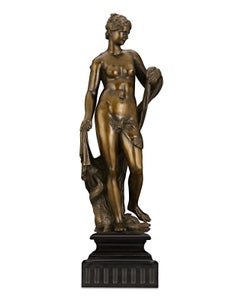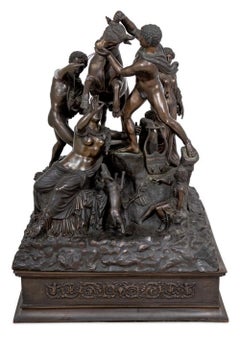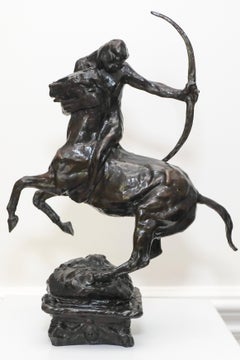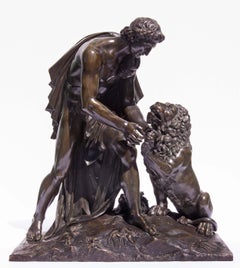Items Similar to Nessus and Deianira Bronze
Want more images or videos?
Request additional images or videos from the seller
1 of 7
Nessus and Deianira BronzeCirca 1660
Circa 1660
$64,500
£49,236.71
€56,600.91
CA$90,763.03
A$100,932.25
CHF 53,011.81
MX$1,233,998.10
NOK 660,577.92
SEK 622,746.56
DKK 422,425.75
About the Item
A technical and creative masterpiece of the late Renaissance era, this extraordinary bronze figure depicts the famed Greek legend of The Abduction of Deianira. Bringing together the classical nude with the poignancy of the emerging Mannerist style, the work represents the culmination of style during the High Renaissance. This masterfully executed French sculpture dating to the 1660s captures the dramatic mythological scene with a daring and sophistication reminiscent of the best works from its age.
The Abduction of Deianira recounts how Deianira, the wife of Hercules, was abducted by the centaur Nessus after he offered to carry her safely across a river. Hercules soon recovered his wife and slew the centaur Nessus–a dramatic moment that would also be captured by Giambologna. Hercules’ victory would be tragically short-lived, however; with his dying breath, the centaur convinces Deianira to take his blood, claiming it held the power to keep Hercules faithful. Fearing her husband would abandon her, Deianira smeared the blood on Hercules’ lion-skin shroud, which burned the divine hero so severely that he threw himself upon a funeral pyre.
This powerful sculpture captures the moment of Deianira’s capture in a virtuosic treatment of bronze, with its two dramatic figures complexly intertwined. Masterfully composed, its deep carving, original brown-red patina and characteristic casting seams around the limbs reveal its rare mid-17th-century origins. The work is modeled after a bronze by the great Renaissance sculptor Giambologna; two versions by his hand are held in the collection of the Louvre in Paris and the Victoria & Albert Museum in London. Giambologna’s treatment of Deianira’s abduction left an indelible impression, and the bronze was highly sought after on a commissioned basis for decades after its inception–owners included Emperor Rudolf II and the French King Louis XIV. One of these, which is almost identical to the present statue, is held in the Princely Collections of Liechtenstein, while others are in the Metropolitan Museum of Art in York, the Wallace Collection in London and the Staatliche Kunstsammlungen in Dresden.
These bronzes, particularly those dating before the 18th century, are highly coveted by both museums and private collectors alike. A spectacular feat of casting, the work achieves a balance so precarious that the centaur Nessus seems posed to fall and gallop forward at any moment. With its high drama and spiral forms, this bronze is a stunning example of late Renaissance art.
French, circa 1660
25" high x 15" wide x 16 1/2" deep
- Creation Year:Circa 1660
- Dimensions:Height: 25 in (63.5 cm)Width: 15 in (38.1 cm)Depth: 16.5 in (41.91 cm)
- Medium:
- Movement & Style:
- After:Giambologna (1529 - 1608, Italian)
- Period:
- Condition:
- Gallery Location:New Orleans, LA
- Reference Number:Seller: 31-91731stDibs: LU18616246602
About the Seller
5.0
Vetted Professional Seller
Every seller passes strict standards for authenticity and reliability
Established in 1912
1stDibs seller since 2013
18 sales on 1stDibs
Typical response time: 10 hours
- ShippingRetrieving quote...Shipping from: New Orleans, LA
- Return Policy
Authenticity Guarantee
In the unlikely event there’s an issue with an item’s authenticity, contact us within 1 year for a full refund. DetailsMoney-Back Guarantee
If your item is not as described, is damaged in transit, or does not arrive, contact us within 7 days for a full refund. Details24-Hour Cancellation
You have a 24-hour grace period in which to reconsider your purchase, with no questions asked.Vetted Professional Sellers
Our world-class sellers must adhere to strict standards for service and quality, maintaining the integrity of our listings.Price-Match Guarantee
If you find that a seller listed the same item for a lower price elsewhere, we’ll match it.Trusted Global Delivery
Our best-in-class carrier network provides specialized shipping options worldwide, including custom delivery.More From This Seller
View AllHercules and the Centaur Nessus Bronze
Located in New Orleans, LA
This extraordinary Italian bronze embodies all of the hallmarks of the very best Florentine sculptures of the 17th century. The work is crafted in the Mannerist style of the late Ren...
Category
17th Century Mannerist Figurative Sculptures
Materials
Bronze
Labors of Hercules Bronze Sculpture, 17th Century
Located in New Orleans, LA
A rare example of late Renaissance sculpture, this impressive Italian bronze captures one of the greatest divine heroes of myth and legend: Hercules. The figure is rendered with stun...
Category
17th Century Baroque Nude Sculptures
Materials
Bronze
Perseus
Located in New Orleans, LA
The legendary Greek god Perseus is the subject of this elegant half-bust by Ubaldo Gandolfi, a major painter and sculptor from Bologna. The son of Zeus and Danaë, Perseus was the le...
Category
Mid-18th Century Other Art Style Figurative Sculptures
Materials
Terracotta
Bronze of Amphitrite after Michel Anguier
Located in New Orleans, LA
After Michel Anguier
French 1612-1686
Amphitrite
Bronze
This remarkable bronze masterpiece was cast after a High Baroque masterwork by French sculptor Michel Anguier. After traini...
Category
17th Century Baroque Nude Sculptures
Materials
Bronze
Bronze of Pluto Abducting Proserpine after François Girardon
Located in New Orleans, LA
After François Girardon
1628-1715 French
Pluto Abducting Proserpine
Bronze
This High Baroque period composition captures the famed narrative of Pluto and Proserpine from Roman mythology. The late 17th-century patinated bronze, created after François Girardon's marble composition, captures the very moment that Pluto seizes Proserpine. The anguished goddess reaches skyward, attempting to escape the god’s grasp while Pluto’s stoic face betrays his knowledge that his ploy will succeed. This pivotal moment in the mythological tale has captured the imagination of many art historical greats, from Bernini to Rubens. François Girardon’s version of the climax demonstrates incredible finesse and artistry, modeled expertly in bronze in the present work by a later sculptor. The statue brings a twist of intertwined bodies into a dynamic frenzy, paralleling the tension of the legendary story.
In ancient Roman mythology, Proserpine, the beautiful daughter of Ceres — known as Persephone in Greek mythology — was picking flowers in the fields when she was suddenly abducted by Pluto, the god of the underworld, and taken to his kingdom. Consumed with grief, her mother Ceres, the goddess of agriculture, scorches the earth, stopping the growth of grain and fruit. Jupiter attempts to intervene and secure Proserpine’s return to earth, negotiating a compromise with Pluto and the Fates that allows Proserpine to be released for part of the year before returning to Pluto’s underworld. Proserpine’s journey back and forth is an allegory for the changing seasons; when Prosperine is with her mother, the earth warms and provides bountiful harvests. Upon her annual return to the underworld, however, the earth once again becomes cold and barren.
After returning to France after years of training in Rome, François Girardon quickly rose to become one of the greatest artists in France. He was elected a member of the Académie Royale de Peinture et de Sculpture in 1657 and would become Chancellor of the Royal Academy in 1695. The artist was approached frequently for royal commissions and Girardon’s Pluto was originally commissioned by Louis XIV for the gardens at his Palace of Versailles. It was one of four monumental marble groups intended to decorate the corners of Charles Le Brun’s never completed garden at the chateau, the Parterre d’Eau. Each group of three figures symbolized one of the four elements: earth, air, fire and water. Pluto’s association with hell made him the apt...
Category
Early 18th Century Baroque Figurative Sculptures
Materials
Bronze
Panther and Hare Bronze Sculpture
Located in New Orleans, LA
This 17th-century bronze sculpture, likely hailing from southern Germany, depicts a scene of life-and-death struggle in nature — a hapless hare caught in the claws of a mighty panthe...
Category
17th Century Figurative Sculptures
Materials
Bronze
You May Also Like
After Pietro da Barga "Farnese Bull" Bronze
Located in Astoria, NY
After Pietro da Barga (Italian, Rome, active c. 1574-1588) "Farnese Bull" Patinated Bronze Sculpture, late 19th century, depicting Antiope directing her sons Amphion and Zethus attac...
Category
Late 19th Century Figurative Sculptures
Materials
Bronze
$6,400 Sale Price
24% Off
Eugene Marioton - Bronze Statue
By Eugene Marioton
Located in Berlin, DE
Eugène Marioton
französisch, 1854 - 1933
Muscular Nude Male Bronze Eugene Marioton - Bronze Statue, um 1900
A handsome and very fit partially draped young nude male with rippling mu...
Category
19th Century Jugendstil Figurative Sculptures
Materials
Bronze
Centaur Bronze Sculpture
By Charles Rumsey
Located in Brookville, NY
Charles Cary Rumsey attended Harvard University, studied art in Paris at the Academie Julian and at Boston School of Fine Art under Bela Pratt. His public works are found worldwide, such as the frieze at the Manhattan Bridge, Zion Park...
Category
1910s American Modern Figurative Sculptures
Materials
Bronze
French Neoclassical Bronze Of Androcles and the Lion
Located in Rochester, NY
Large French Neoclassical sculpture of Androcles and the Lion. Exceptional quality casting and patina. Mid 19th century.
The runaway slave Androcles became friends with a wounded lion...
Category
19th Century Figurative Sculptures
Materials
Metal, Bronze
French Neoclassical Bronze Of Androcles and the Lion
Located in Rochester, NY
Large French Neoclassical sculpture of Androcles and the Lion. Exceptional quality casting and patina. Mid 19th century.
The runaway slave ...
Category
19th Century Figurative Sculptures
Materials
Bronze
Mercurius Bronze Sculpture Contemporary Classic Mythology
By Margot Homan
Located in Utrecht, NL
Mercurius Bronze Sculpture Contemporary Classic Mythology
The sculptures of Margot Homan (1956, Oss, the Netherlands) show a perfect command of the o...
Category
21st Century and Contemporary Contemporary Figurative Sculptures
Materials
Bronze
More Ways To Browse
Antique Bronzes
Paris Art Bronze
Antique Sculptures London
Greek Bronze Figure
Spiral Bronze
Antique Hercules
Bronze Victory
Sculpture Of Two Lions
Wallace Antique
Bronze Sculpture 17th Century
Greek Red Figure
Antique Centaur
Lion Statue French
Centaur Sculpture
Victory Statue
Centaur Bronze
17th Century Safe
Hercules Bronze
